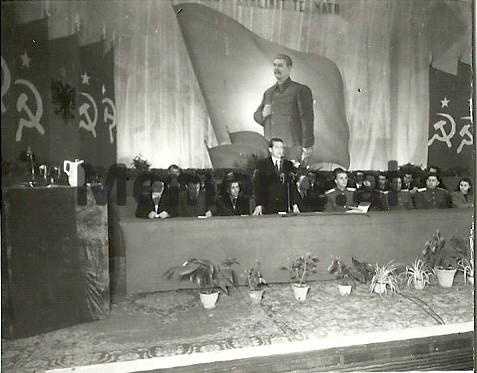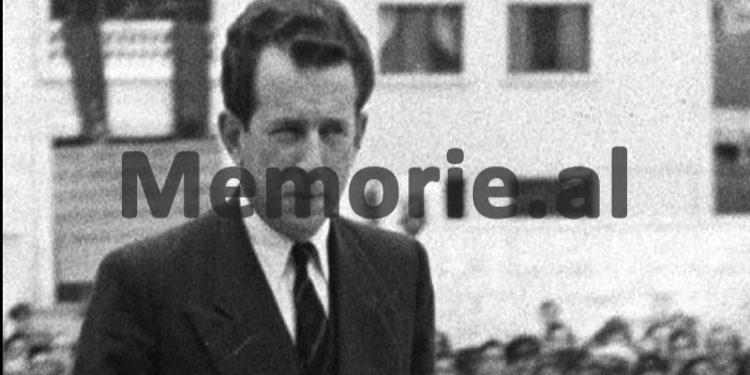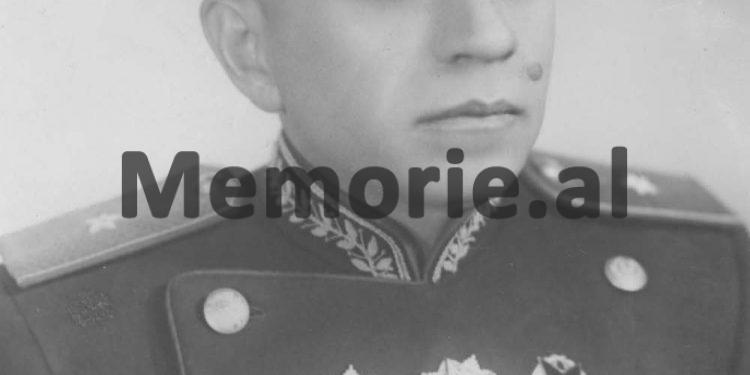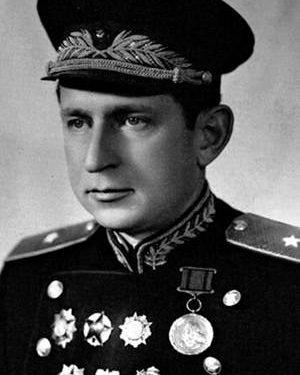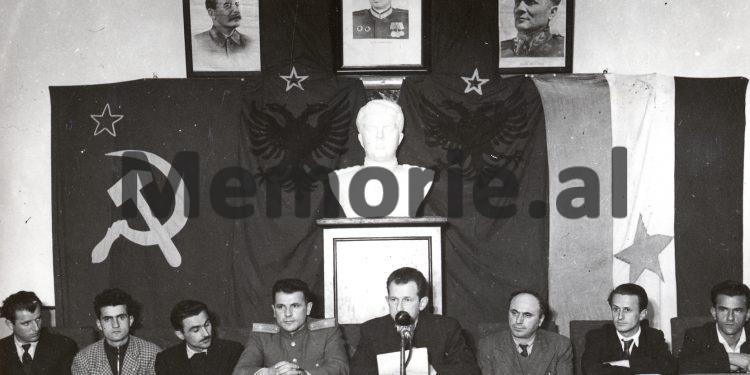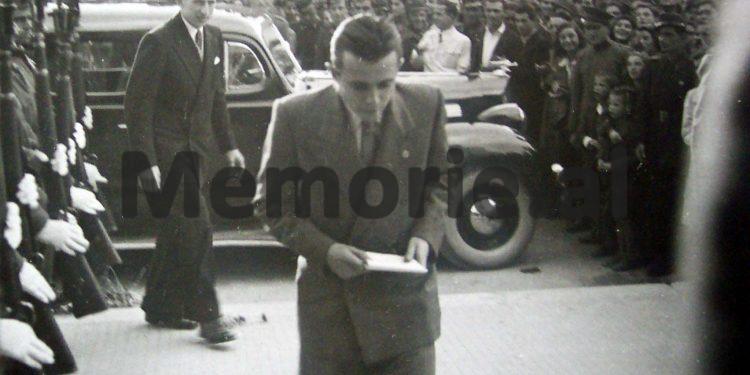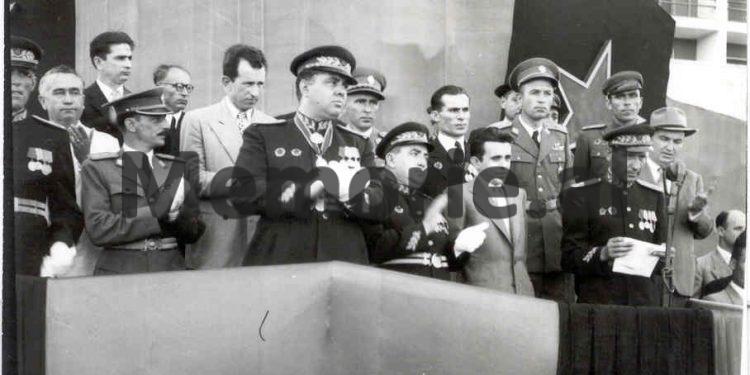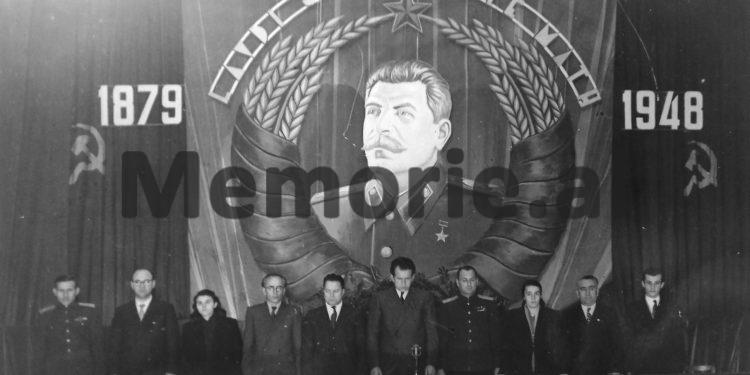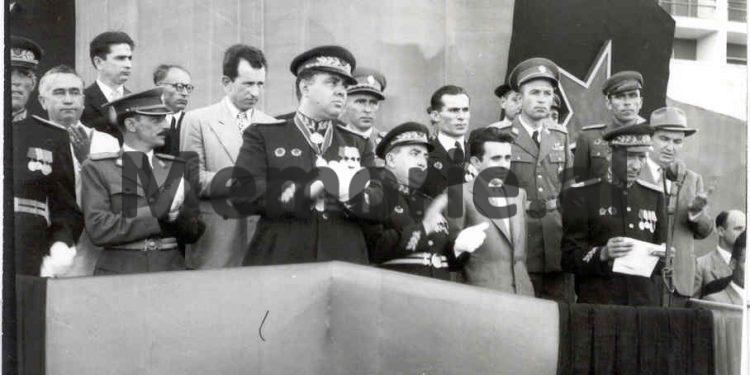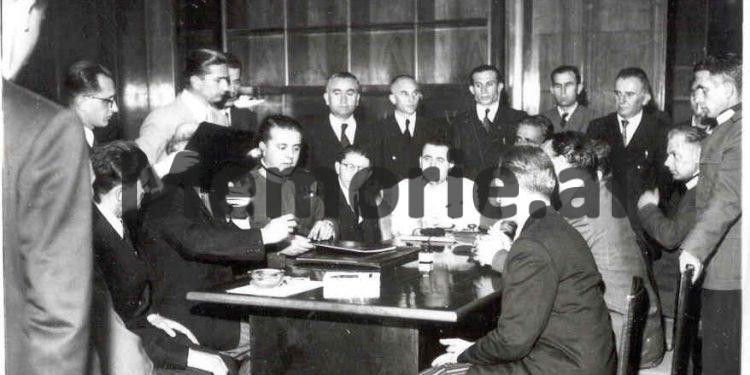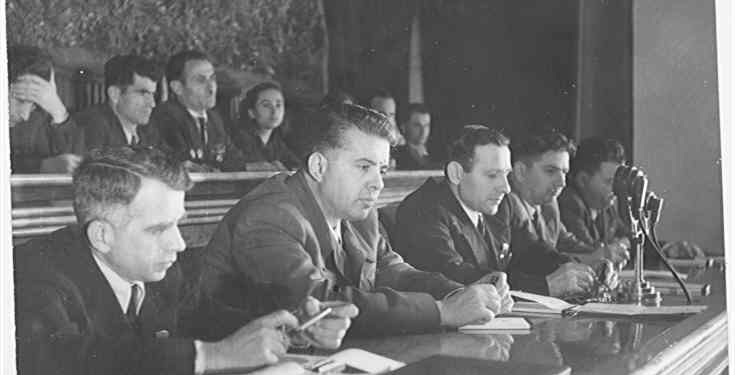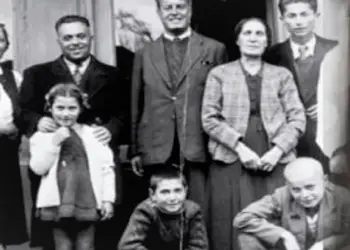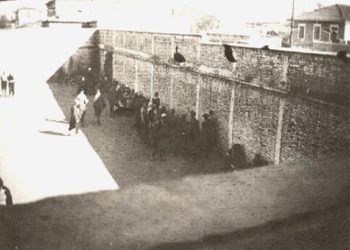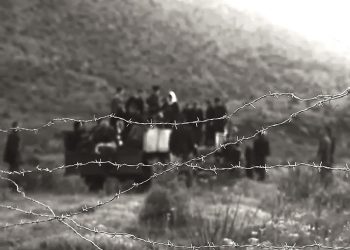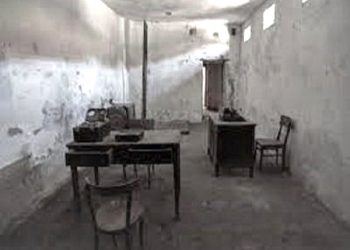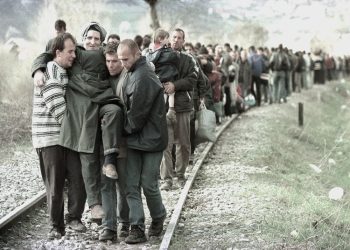Dashnor Kaloçi
Memorie.al publishes some archival documents extracted from the fund of the former Central Committee of the ALP that belongs to June 1955 when the XIV Plenum of the Central Committee was held which analyzed the “anti-party activity” of Tuk Jakova and Bedri Spahiu, two of Enver Hoxha’s closest associates since the founding meeting of the Communist Party on November 8, 1941, who held the highest positions and functions in the party and government, after Enver Hoxha. The controversy and the rift between them came after a visit made by Tuk Jakova together with Abdyl Këllezi and Hito Çako to the Museum House of the establishment of the SNP, where he was irritated when he saw the photo of Spiro Kolekë, which is for him. Tuku had talked to Bedri Spahiu, who held the post of Minister of Education and Culture, but he replied that the museums no longer depended on the digester he headed, but on the propaganda sector headed by Nexhmije Hoxha. After that, all the complaints that Tuku had made went to Enver Hoxha and in the debates, they held in the meetings of the Plenum, Tuku raised serious accusations against Enver Hoxha, accusing him of not being elected Secretary-General at the founding meeting. and that the Albanian Communist Party had been formed by the Yugoslavs. Enver Hoxha’s unknown speech at that plenum where he raised a series of serious accusations against Tuku and Bedri, calling them “enemies of the people and the party” and ultimately excluding them from all party and state functions they held.
Three days ago, in the first part of the interview with the former Vice President of the Supreme Court of the People’s Republic of Albania, Colonel Mustafa Qilimi, we were introduced to the intrigues of the State Security, Investigation and Prosecution bodies, which carried out the orders and orders of the Central Committee. of the ALP and personally Enver Hoxha himself, regarding the sensational process of sentencing and shooting of Major General Dali Ndreu and his wife, former member of the Politburo, Liri Gega, which provoked the intervention of Nikita Khrushchev, who accused Enver of shooting Liberty even though she was pregnant, while in the second part of this interview, according to the testimony of Mr. Qilimi was introduced to another dark page of Enver Hoxha, the one related to the imprisonment and elimination of Hoxha, two of his closest associates, Major General Bedri Spahiu, a former member of the Politburo, secretary of the Central Committee of the ALP, General Prosecutor of the Republic and Minister of Education and Culture, as well as Lieutenant General Tuk Jakova, former founder of the Communist Party, member of the Politburo, Organizational Secretary of the SNP, President of Trade unions of Albania and Deputy Prime Minister to the government led by Enver Hoxha. The conflicts and the great rift between them came after Tuk Jakova’s visit to the Museum House of the founding meeting of the Communist Party of Albania, where he revolted after the photo of Spiro Kolekë, who had not been a participant in that meeting at 8, was posted. November 1941. According to the rare testimony of Colonel Mustafa Qilimi, the former Deputy President of the Supreme Court of the Republic, after that event between Enver and Tuku and Bedri, there was no more “peace”, as they severely accused the “Commander” at the meetings of the Bureau and the Plenum, which Enver gave them an “earring” to strike and take revenge on them only two or three years later, in 1955, which is what this article is about. We are publishing today on the pages of Memorie.al, where, as we will see, Enver Hoxha has set up a “mountain” with accusations against his two closest associates.
Enver’s speech held at the 14th Plenum on June 17, 1955
SPEECH OF THE CLOSURE IN THE XIV PLENUM OF THE Central Committee of the Albanian People’s Party ON “ACTIVITY AND ARMIQUE ACTIVITIES OF TAK JAKOVA AND BEDRI SPAHI”.
June 17, 1955
Allow me, comrades, to say a few words about the issues discussed in this plenum regarding the anti-party and hostile activity of Tuk Jakova and Bedri Spahiu. It is clear that the analysis made by the Politburo and the Central Committee of this problem of such great importance to the Party has been entirely fair and we can consider it a lifesaver for it. This was achieved because the leadership of our Party is a Marxist-Leninist leadership, seasoned, tried, and fighting for the protection of Marxism-Leninism, the interests of our people, the interests of the glorious leadership of the people, the Labor Party of Albania. , the interests of socialism and communism. First, in my opinion, the Plenum of the Central Committee showed great maturity in resolving this issue fairly. With the discussions he made, he stood at the right height and, with the greatest sharpness and the soundest revolutionary vigilance, analyzed in-depth, in detail and on the basis of facts the anti-party and anti-Marxist actions carried out by Tuk Jakova and Bedri Spahiu. This was a very big guarantee for our Party, an extremely big guarantee. This fact clearly proves once again that the Central Committee of our Party is a shield of the principles of Leninism, that in the Central Committee of our Party for a long time there can be no room for opportunists and enemies, with all means, forms, methods, and masks they can use. Before the celibate unity of our Party, elements like Tuk Jakova and Bedri Spahiu cannot have a long life in the Party. Second, Tuku, Bedri, and others like them must understand that the unity of the Central Committee is not just a formula, but a great reality.
The leadership of our Party is a sound, collegial, Leninist-Stalinist leadership. In the Central Committee, not only the opinion of one of seven people can be possessed, as Tuku has claimed, when a decision has been made against him, but it is the will, opinion, and collegial decision of the entire Central Committee. This is what life proves, facts prove. This was best confirmed by the proceedings of this plenum, where we practiced another form so that Tuku and Bedriu could see in particular that the unity of the Central Committee, the unity of thought and action in the Central Committee of our Party, is not so. how do they think? The form used at this plenary meeting was that members of the Politburo spoke at the end, while those who spoke first were members of the Central Committee, who freely expressed their views, as they have consistently acted when they received it. the word in the leadership of our Party.
Tuku and Bedriu’s view that there is no unity of thought and collegiality in leadership is completely wrong and baseless. The conclusions reached by the Politburo and the plenum, which discussed the issue of Tuk and Bedri extensively and correctly, were not shaken by the cannon either. These conclusions did not come by themselves, but are a logical consequence of the facts and are completely grounded. The life and war of the Party show that, if there is an issue that does not stand properly, the Party’s war will soon reveal all the truths. The conclusions reached by the Plenum of the Central Committee of our Party are as follows: Tuku and Bedriu cannot be separated from each other because they have the same goals. The conclusion based on the analysis of the Politburo is that these two, with their activity, wanted to liquidate our Labor Party, our Marxist-Leninist Party, and instead be a social-democratic, anti-Marxist party, with fascist tendencies.
So the purpose of these two was one: to liquidate our Marxist-Leninist Party and replace it with another bourgeois party, as Titua did before with his leadership. Of course, in order to liquidate the Party, the existing Marxist-Leninist leadership must first be liquidated and the Party leadership must be in their hands. These are the savage actions of the enemies, and when we speak in this way we mean the Trotskyists and all the other enemies of the Party. This is not a question of liquidating one, two, or four of the leaders of the leadership, but of liquidating the entire Marxist-Leninist leadership of our Party, that is, of liquidating all this leadership and defending Marxism-Leninism, the principles of our Party, and thus liquidating it. which protects the interests of the Albanian people, socialism, and communism in our country. That was their goal. To achieve this goal, of course, the enemy falls to the people: one here, one there, to eliminate these ones by one, and then replace them with other people, strangers to Marxism-Leninism that would lead them. Our party and people in the lap of imperialism.
We have to put the points well on them, also for the reason that Tuku and Bedriu in all their activity, which I will explain below, have been contradicted by the Marxist-Leninist line of our Party. They could not agree with this line. I did not say that to their words, I did not say that we do not need to go into detail again, because they are clear. Now I think I will focus on some general conclusions to see why these people got here. They got here because they are not Marxists-Leninists and Bedri is not only not like that, but he is also an enemy of the Party and the people, his guilt is much more serious. Tuku and Bedri have never been Marxist-Leninist. Who are and how do those who are not Marxists but are removed as such act? From the very experience of our Party, from the great experience of the Communist Party of the Soviet Union and the international communist movement of the proletariat, we know the methods, forms, formulas, and activity of the pseudo-Marxist people of International II and the Trotskyists, who came as the tails and interactors of International II.
The issue that Tuku raised over the old communist groups is not something simple. Tuk’s aim was not only to elevate himself but also to re-emphasize the weaknesses of these groups, which, as we know, have all been vividly anti-Marxist views. which led to the formation of the Party, to the defense of communism, to the liberation of the homeland. Many of the people in the groups, one of whom is Bedri, who turns out to be the wildest (I’ll explain later why) and Tuku, have not been cleansed of the anti-Marxist views of these groups. The life of the Party, its struggle, worthily destroyed the anti-Marxist views of the groups, but these views have existed and are constantly preserved in Tuku and Bedriu. What anti-Marxist views of groups should we mention on this occasion? The groups did not trust the proletariat, so they were against the dictatorship of the proletariat. Remember the theory of Anastas Lulo in whose group comrade Bedri militated even after the formation of the Party. The group where Bedriu militated was for the occupation of Albania by Italy. The leaders of this group said that: this occupation will do Albania a lot of good, because the factory will be built and the proletariat will be created, then we will see and do.
That is, to have proletariat once, without the others then we see them, views that are anti-Marxist, Trotskyist. We see these views of Bedri in the fact that he agrees to become a member of the Fascist Party, and with this he accepted the occupation of Albania. No one can deny this fact. Bedriu was of the opinion that they should join the Fascist Party, and so he claimed that people would gather there and work with them. Bedriu has implemented these anti-Marxist views in his life. Bedriu joined the Fascist Party, apparently not in order to disguise himself. It is now clear that he was ideologically meeting. Were there other anti-Marxist views and actions in the group? The issue of banditry was also raised in theory. We do not have facts about Bedrina who took part in the theft or committed immoral acts, etc. We do not say this, but today’s act of Bedri, holding a very arrogant attitude towards the plenum, for me is a fascist act, otherwise, there is no way to explain it!
That is, ideologically, Bedri is on a fascist path, and what he is doing today is an act of banditry. Even a patriot, without being a Marxist, and there are hundreds and thousands of them in our country, cannot behave as he did today in front of the Central Committee Bedriu, which the Party has elected to its highest leadership. He, therefore, had no respect for the Party. He held a vile attitude because his views were fascist. The issues that Bedri wants to raise here cannot lie to the Central Committee, nor can they touch the hearts of his comrades from his words that he said that I was not poor, I did not grow up in misery, etc. What does the truth tell? It has happened in life that you can be poor and betray the people and the Party. The facts prove how you fought and how you defended the Party and the people. Bedri Spahiu’s nationalist-bourgeois views are not in vain; these are based on it. Apart from what was said, the point is that all of Bedri’s actions are in line with the ideology of the Bektashi clergy. After all these views and anti-Marxist actions, what Bedriu has repeatedly said that “I became my hob for tactical reasons” can no longer be swallowed up. This is not a tactical issue for Bedri, but an ideological issue. In his head there are idealistic views, which fully agree with the reactionary views of the clergy. In his head, Bedriu maintains idealistic views, which have nothing to do with Marxism. Let us take the issue that Bedriu again calls a tactical stance. He has sought to study the books of the so-called American and English religious societies, but they are nothing but agency societies. What this man is, and he is taken away from us as a Marxist, and in such difficult times for the people and the Communists, he tries to study books. It happens that Bedri is attracted to these religious, idealistic ideas. Did Bedri fight? Yes, he fought, just as he fought. But why did he fight, when he had all these things in his head? The whole nation took part in the National Liberation War because the moment was the liberation of the country. So Bedri, pushed by this moment, went to war. Tuku also took up arms and fought, but despite participating in the war, these views did not change in these people.
In fact, Bedri, even though he took part in the war, since its inception, has been against the Party line, against the leadership chosen by the Party. We know these things from the analysis that has been done and that Comrade Haki Toska rightly pointed out very well. These show that throughout the war, Bedriu did not agree with the Central Committee and the straight line Marxist-Leninist Party. If we analyze Bedri’s attitudes even during the war against the peasantry, what theoretical conclusions should we draw? We can conclude that he was not for the poor peasantry, but for the aghallars. The Central Committee has criticized Bedrina for his actions in Gjirokastra, in relation to the peasantry. This illustrates the fact that Bedri was never a Marxist. He, as we have pointed out, has not been and is not even with the proletariat, having no faith in it, and consequently was not even for the alliance of the proletariat with the peasantry. This seems unimaginable, but so it turns out if we analyze the facts, and the time has come to do such an analysis. Bedri later expressed anti-Marxist-Leninist views later in the post-liberation period. They remain continuous throughout his activity. Why do we say that these things are not accidental? The facts show that Bedri’s views coincide with those of Sejfulla Malëshova. But why did Bedri agree with them, what influence did Sejfullau have on Bedri? The thing is, both of them are on the same path, against the Party line. Sejfullau is already running against the Party, but this does not mean that Bedriu is not on a path with him, he has been on that path before, so he went and supported Sejfullau and Ymer Dishnica.
When Sejfullau was hit, Bedriu and Tuku told us to withdraw from the Politburo because disagreeing with the Party line, they were afraid of the Party, they could not live with such leadership that defended Marxism-Leninism, so they demanded to withdraw. Where has a Marxist been seen resigning from the Party? Bedriu stands up and proudly says that the Politburo did not remove me, but I asked to remove myself, as I was a member of the Fascist Party, as if the Party did not know this. The party knew this and thought that it was a coincidence, but Bedri’s life and actions show that he was not a member of the Central Committee, so he asked to resign as a member. This did not drink water when the opportunism of Sejfulla Malëshova was liquidated and Bedri suffered a lot. At the time of the party’s II Congress, Bedriu thought it was time to leave the Politburo. Only an anti-Marxist can do such a thing. Tuku has also made a very serious mistake, but at least he says he will make every effort to correct me, where the Party will send me. Bedri’s fierce stance before the Central Committee Plenum is another fascist demonstration, in which he proves that he must be ousted from the leadership. Undoubtedly, my opinion is that Bedri should be expelled, not only from the leadership but also from the Party. He also thought of this in order to escape once and for all from the suffering he has been going through for so many years! And in fact, Bedriu suffers because he is inadvertent, against his will in a Marxist-Leninist party being anti-Marxist-Leninist and against Marxism-Leninism. His actions, even if you take them apart, go out of their way; all these are contrary to the Party, actions that create obstacles for me that the Party line is not implemented properly, that the construction of socialism in our country does not move forward with vigor. On this road, Bedri would definitely not come and say, “Here I am.” In, Bedri’s actions have not gone unnoticed or criticized. But now is the time to analyze them in-depth, because they are not detached, but are systematic actions against the Party, against its straight line.
Bedri seeks to hide his legs like a snake, he tries not to say a word about his views on bourgeois nationalism. Stupid he is not, that he is accepting these, all his actions come to the fore. Take note: he agreed to be better called an anti-Marxist, only to say nothing about his bourgeois nationalism. Then, Bedri with views such as how could he not agree with Tuk? He would inevitably come to terms with any current, be it Yugoslav Yugoslavism or Italian x or y, with any anti-Marxist mask appearing only to depend on the Party leadership. And it is a fact that Bedriu worked to weaken the leadership, despite the fact that he tried Koçi Xoxen, etc. But imperialism, Tito, etc., forgave Bedri for his mistakes, because he worked against the Party and the people, striking at their Marxist-Leninist leadership. Then what Tito and the imperialist agencies will do with Bedrina is another matter. We know that there are contradictions within the bourgeoisie, but now they see the mainline, its strategic goal, which is the eradication of communism and communist parties, then tomorrow they will sort things out between them.
Let’s come back to the Shkodra group. Tuku has not yet been cleared of this group’s misconceptions. We must theoretically explain Tuk’s great interest in handicrafts. Why is Tuku more interested in artisans than in the working class and agricultural development? Because in principle Tuku still has Trotskyist, deviant, opportunistic views, which are all anti-Marxist. It relies mainly on artisans, the small bourgeoisie, and not the working class and its alliance with the peasantry. We can bring as many facts as you want, but this is already clear. Even the issue of the influence of the Catholic clergy has not disappeared in Tuku. He has to make a much bigger fight against these shows. This is not about the priest’s letter, about all the poison that the church, the dervishes, the imams, and the priests spread among the people. Why do they do this? Their main goal is the fight against communism and specifically in our case against our Marxist-Leninist Party. If you analyze these, many things become very clear. Tuku is an extremely weak Marxist in this regard as well. Tuku has fought. We do not deny this. But the war he waged did not help him strip himself of this hostile bourgeois ideology. Tuku could not wholeheartedly support the Party leadership and its line, as his micro-bourgeois, opportunistic views have stuck with him and do not let go. Whether or not Tuku acted in an organized manner is not very important in explaining the matter. The party needs to look deeper, deeper, and to the end that if Tuk’s work has been organized, Tuk’s work is even more dangerous. But to explain the matter, Tuku must have thought these things that his views are such that they do not allow him to think otherwise. These are ideological issues and are not in the way of our Party. So it turns out that anti-Marxist and anti-party views have led Tuku to this path that causes damage to the Party, while Bedriu has been taken even further. He is no longer in a hostile position but is an enemy of the Party. If we look at it through this prism, it is so natural and we should not be surprised why these friends go out on this street.
Moments that pass, and especially with these views, Tuku wants to get out of the way of Titoism. The Titoists, Tito and his comrades, have deviated from the Marxist-Leninist path, they have betrayed Marxism-Leninism. This stands and will remain motionless. This is not going to go away. It will only disappear if these people give evidence if they fight and give concrete evidence to the Yugoslav people and the communist and international workers’ movement that really corrected their mistakes in terms of Marxism-Leninism. But so far they have not done any of these. This evidence for our Party is the main thing. They will show whether Tuku and Bedriu will be corrected or not. We cannot allow, as Tuku and Bedriu would like, to stay in the Party while maintaining their views and opposing the Party, i.e. to live together on both sides. That way we can’t live together. As for the attitude of the Titoists towards our country, all that we have said stands, they do not move, because their work and actions are anti-Marxist. A clique that has turned to bourgeois nationalism, which seeks to destroy its own party, Marxism-Leninism, a clique that opposes Lenin and Stalin, a clique that seeks to devour you, a clique that is in an anti-Marxist position. But this does not stop us from having good friendships and neighborly relations with the peoples of Yugoslavia, from having trade and state relations.
I think Tuku needs to go even deeper. I, too, am for Tuku to be expelled from the Central Committee, as the entire plenum agrees, but to remain in the Party. I just propose another measure, so that for an indefinite period of time there will be no leading position in the Party. Tuku does not think that his stay in the Party is an opportunity. We keep him in the Party because the Central Committee wants to once again lend a hand to Tuk Jakova with all these serious mistakes he has made because the Central Committee has a glimmer of hope that he can improve. But don’t think that Tuku now has full confidence that he will correct the mistakes, as this is the second time he has made such mistakes, this time even worse than the first ones. But the Party will help him, but he must first help himself so that he can deserve this hand that the Party gives him. Tuku has more Bedriu to understand well that the Party does not persecute people, in any way. On the contrary, the Central Committee agrees that the grassroots organizations criticize it and say, “How are you keeping Tuk Jakova in the Party after all these serious mistakes he has made?” And the Central Committee will respond: once the hand, let us give him a little help once more, but Tuku must give proof. The Central Committee takes the measure it takes by leaving Tuku in the Party with full consciousness because the Central Committee is the leadership of a Marxist-Leninist Party. First, Bedri, then Tuku, should not think that the Party is doing this in order not to reduce its influence in Shkodra or Gjirokastra. If there are people who think that the communists and the people of Gjirokastra or Shkodra love the Party for the beautiful eyes of Bedri, Tuk, or anyone else, they are wrong. The people love the Party because it saved it from the occupiers, gave it freedom and power in its hands, and is now leading it to socialism. The people love the people who love the Party and, on the contrary, they hate those who are against the Party, which is the most precious thing for the people. They should be convinced that the people of the Party will applaud this decision because it is completely right. The people and the Party will say snakes outside the Party. In the Party and in the people, you must be open and not do tricks and such things of this nature, as Bedriu does. Therefore, Tuku and Bedriu should keep this in mind, because the Party is not afraid of the sick elements, whether inside or outside it. The Party’s conviction is that one or five people do not shake or undermine the Party’s great prestige among the people.
As far as Bedri is concerned, I am one hundred percent convinced by what I said and my opinion of the plenum should be taken into consideration, which means that Bedri should be expelled not only from the Central Committee but also from the Party and advised to remember that this path of leads very, very far. Now, as we said, where the Party will appoint them, they have to work with full conscience, to ‘make the school from scratch. Megalomania and all those other vices that are very bad, fight them with the utmost severity, because only here lies the hope of their rehabilitation. Thus, they will be able to enter the rails of the Party and Marxism-Leninism, because now they are not, especially Bedri is completely out of these rails. Now we don’t have to go any further. What we said will be put to the vote one by one. Who is it that Tuku is expelled from the Central Committee and from today’s state functions but remains a member of the party and for an indefinite period of time has no leading position in the Party?
1 Who agrees that Bedri should be expelled from the Central Committee, from the Party, and from today’s state functions?/Memorie.al




